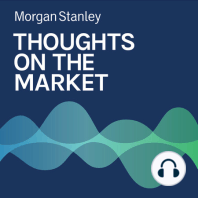4 min listen

Special Encore: The Fed - Learning From the Last Hiking Cycle
Special Encore: The Fed - Learning From the Last Hiking Cycle
ratings:
Length:
6 minutes
Released:
Apr 5, 2022
Format:
Podcast episode
Description
Original Release on March 30th, 2022: As the Fed kicks off a new rate hiking cycle, investors are looking back at the previous hiking cycle to ease their concerns today. Head of Public Policy Research and Municipal Strategy Michael Zezas and Global Head of Macro Strategy Matthew Hornbach discuss.-----Transcript-----Michael Zezas: Welcome to Thoughts on the Market. I'm Michael Zezas, Head of Public Policy Research and Municipal Strategy for Morgan Stanley. Matthew Hornbach: And I'm Matthew Hornbach, Global Head of Macro Strategy for Morgan Stanley. Michael Zezas: And today on the podcast, we'll be discussing the last Fed hiking cycle and what it might mean for investors today. It's Wednesday, March 30th at 11:00 a.m. in New York. Michael Zezas: Matt, we've recently entered a new Fed hiking cycle as the Fed deals with inflation. But it seems like clients have been focusing with you of late on the question of what drove the Fed during the last hiking cycle, where they paused their tightening and started to reverse course. Why is that something investors are focusing on right now? Matthew Hornbach: Well, Mike, investors are looking for answers about this hiking cycle, and a good place to start is the last cycle. The past week saw U.S. Treasury yields reach new highs and the Treasury curve flattened even more. Markets are now pricing Fed policy to reach a neutral setting this year of around 2.5%. The market also prices Fed policy to reach 3% next year. For context, the Fed was only able to raise its policy rate to 2.5% in the last cycle. So the fact that markets now price a higher policy rate than in the last cycle, after which the Fed ended up cutting interest rates, has people nervous. It's worth noting, though, that a 3% policy rate is still some distance below policy rates in the mid 1990s and the mid 2000s. Michael Zezas: Got it. So then, what do you think of the argument that the Fed may have over tightened in the last cycle? Matthew Hornbach: Well, instead of telling you what I think, let me tell you what FOMC participants were thinking at the time. I went back and read the minutes from the June 2019 FOMC meeting. That was the meeting before the Fed first cut rates, which they did in July. I chose to focus on that meeting because that's when several FOMC participants first projected lower policy rates. And according to the account of that decision, participants thought that a slowdown in global growth was weighing on the U.S. economy. In fact, evidence from global purchasing manager data showed that growth in emerging market and developed market economies was slowing, and was occurring well before the U.S. economy began to slow. And also, data suggested that global trade volumes were well below trend. So Mike, let me put it back to you then. It seems to me that Fed policy wasn't driving economic weakness back then, but that something else was driving this change in global economic activity. And I think, you know where I'm going with this... Michael Zezas: Yes, you're talking about the trade conflict between the U.S. and China, where from 2017 to 2019 there was a slow and then rapidly escalating series of tariff hikes between the two countries. It was a very public pattern of response and counter response, interspersed with negotiations and sharp rhetoric from both sides, eventually resulted in tariffs on hundreds of billions of dollars in traded goods. Now, those tariffs endure to this day, but the tariff hikes stopped in late 2019 after the two sides made a stopgap agreement. But even though this was just a few years ago and perhaps seems tame in comparison to the global challenges that have come up since, like the pandemic and now the Russia-Ukraine conflict, I think it's important to remember that at the time this was a big deal and created a lot of concern for companies, economists and investors. You have to remember that before 2017, the consensus in the US and most of Europe was that free trade was good, and anything t
Released:
Apr 5, 2022
Format:
Podcast episode
Titles in the series (100)
Andrew Sheets: A Second (and Third) Opinion for Equity Markets by Thoughts on the Market